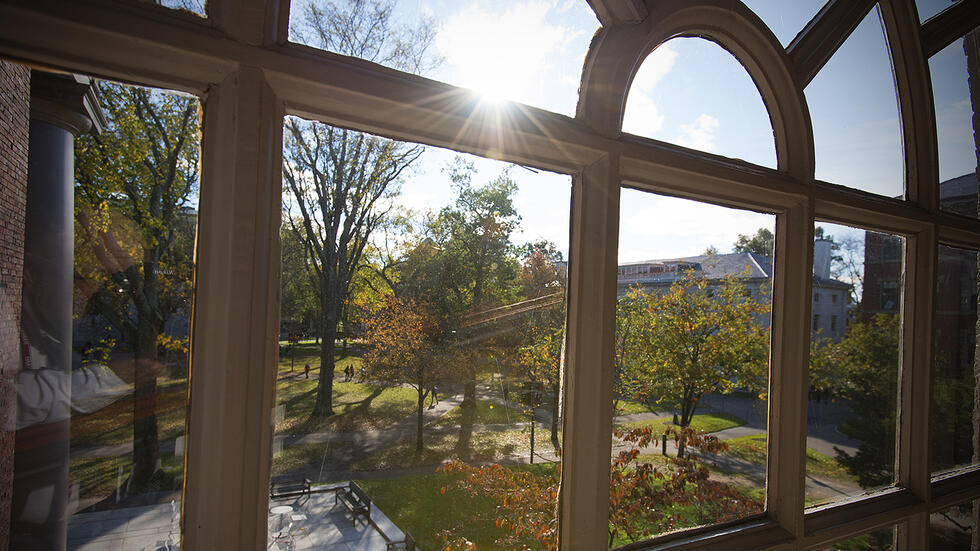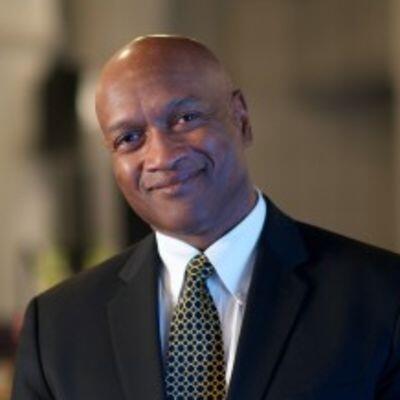 Sermon by the Rev. Ray Hammond ’71, M.D. ‘75, A.M. ’84, the founder and pastor of Bethel African Methodist Episcopal Church in Boston and co-founder of Ten Point Coalition, March 14, 2021. (File photo by Jeffrey Blackwell/Memorial Church Communications)
Sermon by the Rev. Ray Hammond ’71, M.D. ‘75, A.M. ’84, the founder and pastor of Bethel African Methodist Episcopal Church in Boston and co-founder of Ten Point Coalition, March 14, 2021. (File photo by Jeffrey Blackwell/Memorial Church Communications)
––
––
 My thanks to the interim Pusey Minister of the Memorial Church, Dr. Stephanie Paulsell, for this invitation to preach and to the staff of Memorial Church for their support into translating that invitation into reality. You've heard the reading of Genesis 15:1-7, which sets the table for our consideration of this sermon's subject, it's not over and God's not done.
My thanks to the interim Pusey Minister of the Memorial Church, Dr. Stephanie Paulsell, for this invitation to preach and to the staff of Memorial Church for their support into translating that invitation into reality. You've heard the reading of Genesis 15:1-7, which sets the table for our consideration of this sermon's subject, it's not over and God's not done.
Just in case anyone thought that 2021 might be less challenging than 2020, let's just say that the results of the first few months of this year are not reassuring. Who knew that our former President would incite a first-in-history riot and insurrection at the Capital that would cost lives, invade the Capitol building, injure dozens of police officers, destroy property and disrupt the democratic process all for the sake of a lie? Or that our political polarization would be as entrenched and toxic despite the clear consequences? Who knew that the rollout of the vaccine that offers so much hope would come with so much difficulty and confusion and inequity? It's clear that the battle for truth and justice and righteousness is not over. Far from it.
It's true in America in 2021 as surely as it was true in the days of a man named Abram, later called Abraham, who finds himself in the middle of a difficult and perilous journey in response to the call of God. On that journey, as Genesis chapters 12 through 14 tells us, Abraham has to deal with a pandemic of problems, external problems, like famine and the fear of police or mob or political violence against himself and his family. And Abraham has to deal with internal problems, family disagreement, personal integrity challenges and deep spiritual weakness. What Abraham didn't fully see was that these problems were a prelude to God doing more than Abraham could have asked or imagined. And despite the pandemic of problems around him, Abraham's journey was not over. And God was not done.
God was far from finished. Indeed, in many ways, God was just beginning to work in Abraham and through Abraham, but at a time of great crisis in his life. This scripture suggests at least four things that he, and perhaps we facing our own pandemic of problems, could do and should do. The first is found in verses two and three and suggest that maybe we need to speak up. And Abram said, "Look, to me you have given no seed and here a member of my family is to be my heir." As the scholar, Robert Alter, says about verse two, "Up until this point, all of Abram's responses to God had been silent obedience. His first actual dialogue with God expresses doubt that God's promise can be realized. This first speech to God reveals a hitherto un-glimpsed human dimension of Abram."
Abraham has to speak up and be honest about his doubts and his despairs and his groans and his griefs. He and we must give voice to frustration and exhaustion, anxieties and fears, because honest conversation with God and others and self-require it. But Abraham and we should also speak up for hopes and dreams, outlandish and impossible though they seem. It's a time to ask and work for the fulfillment, even in part, of promises made by God. That's the start of a real encounter with the living God, not the bellhop God that is here to satisfy my every wish, nor the abusive God who's waiting for me to get it wrong so I can be punished, but the living and loving God of truth and righteousness and justice and grace. So speak up in times of prayer and meditation. Speak up in private conversations and even public proclamations. Amidst a pandemic of problems speak up, because you know it's not over. And you really hope that God is not done.
You do need to speak up and verse five suggests you've got to be ready to step out. And God took Abraham outside and God said, "Maybe you have to be willing, and I, to get outside our comfort zones, outside the status quo, outside the norm, outside the usual and the expected in the way we've always done it and the way we used to do it before the pandemic or some other crisis messed up everything." Maybe we've got to step outside, outside of form and fashion, outside of everyday circumstances, outside of comfort and complacency, outside of the popular and the go-along-to-get-along. Maybe this is the time to speak up and be ready to step out.
Now, I know that's easy to say, and it is hard to do. And it's hard, because stepping out entails risks. The risks of entrusting yourself to a crazy God who tells you in advance, as recorded by the prophet Isaiah in the 55th chapter, "For as high as the heavens are over the earth, so my ways are high over your ways and my devisings over your devising." And the risks are not just on the divine side. They're equally salient on the human side, where stepping out and moving in new directions will cause some to fear you and others to discourage you. Some to envy you and others to undermine you. Some to misunderstand you and others to misinterpret your motives. But you must persevere and step out.
The theologian, Howard Thurman, put it so beautifully, "Look well to the growing edge. All around us worlds are dying and new worlds are being born. All around us life is dying and life is being born. The fruit ripens on the tree. The roots are silently at work in the darkness of the earth against the time when there shall be new leaves, fresh blossoms, green fruit. Such is the growing edge. It is the extra breath from the exhausted lung, the one more thing to try when all else has failed, the upward reach of life when weariness closes in upon all endeavor. Look well to the growing edge." I'm convinced that to have a rich and real encounter with God, you've got to speak up and be ready to step out, because it's not over. And God's not done.
Thirdly, you want to look up, as verse five, again, declares, "God says to Abraham, 'Look up to the heaven.'" Someone asked a wise old shepherd how sheep managed to get lost and separate themselves from the flock. And the shepherd said, "Sheep just don't get lost. They nibble themselves lost." The sheep, in other words, never look up to see where they're going or how far they've wandered from the flock. And all they can see is the next good tasting patch of grass and the next, and then the next. You know that grass is a good thing and essential to life, but they follow it so single-mindedly it leads them, ultimately, in the direction of death. Maybe crisis is the time to look up and check out how far off track you and we might be, to look up, to see the dangers of animus as we make choices rooted in pleasure, instead of purpose, self-interest instead of integrity, power instead of principal, career instead of calling and fear instead of faith.
This may well be the time to stop looking down and start looking up, because you know what? You're better than that. You deserve more than you're settling for. Someone's lying to you about what you and we can't do and where we can't go and what we can't become. And that someone may be us. You can succeed. You can start that enterprise. You can finish that degree or training. You can raise healthy children and be an advocate for justice and be a great disciple and follower of Christ, but you've got to look up and get back on track. Look up and keep things in perspective and know that it's not over and God's not done.
And finally, in verse six, it declares that, "Abram trusted in the Lord." You know, I'm an avid scuba diver and I love this story recorded by an author who writes, "I had a conversation once with a former Navy diver about diving deep, really deep. He told me that he had been in situations so deep and dark that it was almost impossible to keep from becoming disoriented and confused. All I could think is, 'Wow, that's an incredibly terrifying feeling, being underwater, unable to see your hands in front of your face, not knowing which way is up, panic engulfing you and I couldn't help but interrupt my friend and say, 'What did you do?' And the friend replied, 'Feel the bubbles. When it's pitch black and you have no idea which way to go, you reach up with your hand and you feel the bubbles, because the bubbles always drift to the surface. When you can't trust your feelings or judgment, you can trust the bubbles to get you back to the top.'"
I hear that story as a diver and I say to myself, "I wonder if we could trust the big God the way divers trust a little bubble." Can we trust that God's best work and our best lessons often begin in the dark and in disorientation? And then when it looks like every door is closed and the walls are caving in, I can trust God to make a way out of nowhere, to cut a window of opportunity out of a wall of obstacles. As the great New England preacher, Phillips Brooks, said, "We never become truly spiritual by sitting down and wishing to become so. No, we must undertake something so great that we cannot accomplish it without the help of God."
Can we trust that word found in second Corinthians chapter four? In the beginning in verse 16, it says this, "For this reason we never become discouraged, even though our physical being is gradually decaying, yet our spiritual being is renewed day after day for we fix our attention not on things that are seen, but on things that are unseen. What can be seen lasts only for a time. But what cannot be seen lasts forever."
You think the last year was hard? I suspect we may have rougher days yet ahead. But this I know, it's not over. God's not done. And if I, and we, can speak up, step out, look up and trust God, the best may be yet to come.
